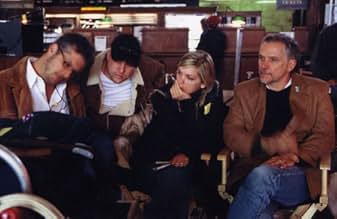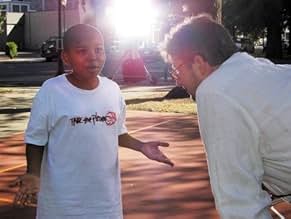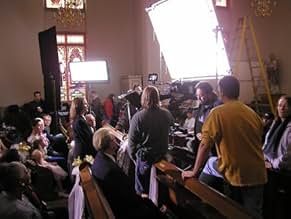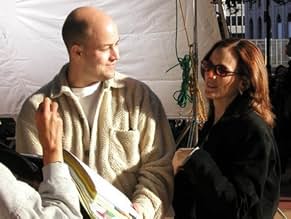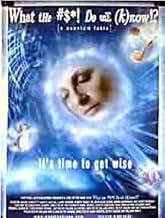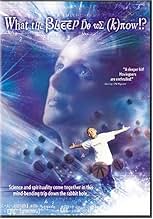Que sait-on vraiment de la réalité!?
Titre original : What the #$*! Do We (K)now!?
- 2004
- Tous publics
- 1h 49min
NOTE IMDb
5,2/10
14 k
MA NOTE
Ajouter une intrigue dans votre langueA fictional photographer's quest to spiritually rediscover herself is interspersed with documentary footage of scientists and theologians discussing the philosophical aspects of quantum phys... Tout lireA fictional photographer's quest to spiritually rediscover herself is interspersed with documentary footage of scientists and theologians discussing the philosophical aspects of quantum physics.A fictional photographer's quest to spiritually rediscover herself is interspersed with documentary footage of scientists and theologians discussing the philosophical aspects of quantum physics.
- Réalisation
- Scénario
- Casting principal
- Récompenses
- 2 victoires au total
James Langston Drake
- Groom
- (as Jame Drake)
Michele Mariana
- Tour Guide
- (as Michelle Mariana)
Avis à la une
I was not surprised to see many of the comments here about this film calling into question everything about it's premise. While reviewing this film for my newspaper (Cedar Rapids Gazette) I knew immediately that the concepts would be controversial and hard for the conditioned American mind to wrap itself around.
Having said that, it seems that many people view a movie like this as an all or nothing proposition -- if one theory or belief seems flawed, then it all must be called into question. What I think too many polemicists are forgetting is that this picture is a smorgasbord of different theories presented, as Rod Serling might say, for you approval -- or not.
But what many are missing is what makes this film revolutionary -- that filmmakers were able to present these concepts in the medium of film in a way that was at least entertaining and most, thought provoking. You don't have to buy off 100 percent on what is here, but the presentation, in and of itself, was stunning in its bombardment of the viewer with multi sensory imagery.
That this film was even made at all is a mini-miracle, especially in our current intellectual and cultural climate. Its sad to me to see such judgmental reviews. I knew conventional Christians would simply dismiss this as "new age" fluff and I mentioned that in my review. But I would have hoped that lovers of film and higher order thinking would be more tolerant of some of the excesses.
In short, this is a film that needs to be seen not just for its quasi-cinematic, quasi-documentary methodology but for a presentation of theories and beliefs that are rarely discussed in the ossified American mainstream. For that alone, I thank the filmmakers.
Having said that, it seems that many people view a movie like this as an all or nothing proposition -- if one theory or belief seems flawed, then it all must be called into question. What I think too many polemicists are forgetting is that this picture is a smorgasbord of different theories presented, as Rod Serling might say, for you approval -- or not.
But what many are missing is what makes this film revolutionary -- that filmmakers were able to present these concepts in the medium of film in a way that was at least entertaining and most, thought provoking. You don't have to buy off 100 percent on what is here, but the presentation, in and of itself, was stunning in its bombardment of the viewer with multi sensory imagery.
That this film was even made at all is a mini-miracle, especially in our current intellectual and cultural climate. Its sad to me to see such judgmental reviews. I knew conventional Christians would simply dismiss this as "new age" fluff and I mentioned that in my review. But I would have hoped that lovers of film and higher order thinking would be more tolerant of some of the excesses.
In short, this is a film that needs to be seen not just for its quasi-cinematic, quasi-documentary methodology but for a presentation of theories and beliefs that are rarely discussed in the ossified American mainstream. For that alone, I thank the filmmakers.
OK, first I'm going to tear down the "Columbus's ships" thing. I'm fairly certain the Caribbeans had some sort of seaworthy craft, such as rafts or canoes. From these, any normal human intelligence can extrapolate their concept of "boat" to include these ships. Also, where did the writer get this story? Source? Since it's not common knowledge, you need a source.
Next is the direction of time question. In Stephen Hawking's "A Brief History of Time," he talks about the 4 arrows of time accepted by the scientific community at large. While it is true that some fundamental (classical/Newtonian) physical laws don't care which direction time is going, many do. The arrow that I remember (it's been a while since I last read the book) is the thermodynamic arrow of time, which causes us to experience events in such a way that the entropy, or disorder, of the universe increases. For example, a cup falls off a table and breaks, not the other way around.
Ah, then the probability discussion. Yes, for subatomic particles like electrons and quarks, the probability wave is spread out enough that the particle can be in >1 place at a time. However, when you look at anything larger than these specks, the waves get exponentially more concentrated, so that a large (visible w/naked eye) object really has an infinitesimal probability of being in more than one state. So small is this probability that you would have to watch a "large" object say, a tennis ball, for more than the present age of the universe (15,000,000,000 years) for it to have an appreciable chance of doing anything strange.
Closely linked to my last paragraph is the talk about particles popping in and out of existence. The answer to "where do they go" is "they turn back into energy." This is what E=mc^2 means. In the "vacuum" of space, particle/antiparticle pairs of subatomic particles are constantly being created from random energy fluctuations, but these particles are existing on borrowed energy, which they very soon have to repay by annihilating with their mate.
Next is the water conversation. First of all, those pictures were of FROZEN water, which the narrator conveniently forgot to mention, only saying the jars were "left out overnight". Next, the claim that our bodies are 90% water is completely bogus. If that were true, there'd be no way we could so much as stand up. Instead: newborns have around 78%, 1-year-olds around 65%, adult men about 60%, and adult women around 55% (http://www.madsci.org/posts/archives/may2000/958588306.An.r.html).
This sheds doubt upon the rest of this "experiment."
The claim that if you only believe enough, you could walk on water is another seriously questionable one. If it's true, why didn't they show us? Tape someone walking on water. Even though you could fairly easily fake it with some video editing software, it'd still be a little more convincing than them simply telling us it's so. Using this "positive thinking" idea to then say that you create your own reality is equally flawed. Sure, I can very well believe that I live in a world inhabited by one-eyed, one-horned, flying, purple people-eaters, but that's irrelevant if the beings you interact with don't see the world this way.
And then the movie goes on to preach to us about God! How can a "scientific" movie propose to do this? Actually, I have a problem with that one guy proscribing what God is and what He isn't. Shouldn't that be up to the individual, thank you very much? Also in this part, one of the women commentators mentions that we have "antigravity." No, we don't. It's that simple.
Biology's not my thing, but there's a point where you just have to bring out a contradiction. One lady says that if you keep bombarding a cell with a certain chemical, the receptors on that cell will decrease. But soon after, a guy comes on and says that this same daily bombardment will cause the cell to produce a new cell when it divides that has MORE of the receptors. Contradiction. Oops.
I also have to comment on the guy who earlier on this board said this movie would appeal to anyone who's read "The Elegant Universe" by Brian Greene. I strongly disagree; I own and have read that book, and nowhere are its ideas remotely connected to this movie's ideas.
Lastly, I will agree with whoever said the movie is rather drawn out. Especially at the end. They just won't stop talking. They keep on going. Repeating the same stuff over and over. Which is what I'm doing for effect, if you couldn't figure that out.
Next is the direction of time question. In Stephen Hawking's "A Brief History of Time," he talks about the 4 arrows of time accepted by the scientific community at large. While it is true that some fundamental (classical/Newtonian) physical laws don't care which direction time is going, many do. The arrow that I remember (it's been a while since I last read the book) is the thermodynamic arrow of time, which causes us to experience events in such a way that the entropy, or disorder, of the universe increases. For example, a cup falls off a table and breaks, not the other way around.
Ah, then the probability discussion. Yes, for subatomic particles like electrons and quarks, the probability wave is spread out enough that the particle can be in >1 place at a time. However, when you look at anything larger than these specks, the waves get exponentially more concentrated, so that a large (visible w/naked eye) object really has an infinitesimal probability of being in more than one state. So small is this probability that you would have to watch a "large" object say, a tennis ball, for more than the present age of the universe (15,000,000,000 years) for it to have an appreciable chance of doing anything strange.
Closely linked to my last paragraph is the talk about particles popping in and out of existence. The answer to "where do they go" is "they turn back into energy." This is what E=mc^2 means. In the "vacuum" of space, particle/antiparticle pairs of subatomic particles are constantly being created from random energy fluctuations, but these particles are existing on borrowed energy, which they very soon have to repay by annihilating with their mate.
Next is the water conversation. First of all, those pictures were of FROZEN water, which the narrator conveniently forgot to mention, only saying the jars were "left out overnight". Next, the claim that our bodies are 90% water is completely bogus. If that were true, there'd be no way we could so much as stand up. Instead: newborns have around 78%, 1-year-olds around 65%, adult men about 60%, and adult women around 55% (http://www.madsci.org/posts/archives/may2000/958588306.An.r.html).
This sheds doubt upon the rest of this "experiment."
The claim that if you only believe enough, you could walk on water is another seriously questionable one. If it's true, why didn't they show us? Tape someone walking on water. Even though you could fairly easily fake it with some video editing software, it'd still be a little more convincing than them simply telling us it's so. Using this "positive thinking" idea to then say that you create your own reality is equally flawed. Sure, I can very well believe that I live in a world inhabited by one-eyed, one-horned, flying, purple people-eaters, but that's irrelevant if the beings you interact with don't see the world this way.
And then the movie goes on to preach to us about God! How can a "scientific" movie propose to do this? Actually, I have a problem with that one guy proscribing what God is and what He isn't. Shouldn't that be up to the individual, thank you very much? Also in this part, one of the women commentators mentions that we have "antigravity." No, we don't. It's that simple.
Biology's not my thing, but there's a point where you just have to bring out a contradiction. One lady says that if you keep bombarding a cell with a certain chemical, the receptors on that cell will decrease. But soon after, a guy comes on and says that this same daily bombardment will cause the cell to produce a new cell when it divides that has MORE of the receptors. Contradiction. Oops.
I also have to comment on the guy who earlier on this board said this movie would appeal to anyone who's read "The Elegant Universe" by Brian Greene. I strongly disagree; I own and have read that book, and nowhere are its ideas remotely connected to this movie's ideas.
Lastly, I will agree with whoever said the movie is rather drawn out. Especially at the end. They just won't stop talking. They keep on going. Repeating the same stuff over and over. Which is what I'm doing for effect, if you couldn't figure that out.
About 20 years ago, I encountered quantum mechanics in The Dancing Wu Li Masters by Gary Zukav, and the Tao of Physics by Fritjof Capra. Despite the *relative* popularity (note the emphasis on "relative") of such books, the average person in the street has never read a science book that wasn't assigned to them in high school or college. And those books certainly weren't speculating on the nature of Life, the Universe and Everything based on the implications of quantum physics!
In my own life, awareness of the intersection of science of spirituality has given me a smidgen of additional fuel in my life of studying Christian and Eastern mysticism. So imagine my delight when I learned "What the Bleep" promised an exciting investigation into the cutting edge of science and spirituality. Surely there would interviews with people like Rupert Sheldrake, Freeman Dyson, and Larry Dossey!
Well, no, although most of the scientists were well-qualified to speak on the quantum concepts addressed. Strangely, the film undercut itself intellectually by not giving the names and qualifications of the speakers underneath their "talking heads" but only at the end. Regarding spiritual speculations, I find Capra, Sheldrake, and Dossey have more depth when it comes to this sort of thought, but the opinions shared may be eye-opening for many viewers who have never considered the inter-connectedness of mind, the universe, and God.
"What the bleep" has a beautiful visual style, exciting graphic effects, and also gets out of typical documentary mode by creating a small story of a deaf woman photographer's frustrations with life. The "Polish Wedding" sequence is hilarious, and might actually have you rolling in the aisles, as it did me!
The disappointment comes, oddly enough from the "Spiritual Teachers, Mystics, and Scholars" used. Sounds impressive right? There were only two. One was "Miceal" Ledwith, (elsewhere spelled Micheal), former member of the Catholic International Theological Commission, (who retired from Maynooth College in Ireland about the same time he made a private settlement regarding sexual abuse of a minor--see the Irish Times article of June 1 2002). The other was--get ready--RAMTHA! Yes, Ramtha, the absurd "Neolithic entity" supposedly channeled by JZ Knight.
Both Ledwith and Ramtha seemed to only be used to bash conventional religion with "the shackles of restrictive doctrine," and in Ramtha's case, assure us all that we are God. Yippee! No need to worry about meditation, service, or denying the ego. Why, I wondered, would someone go to the trouble of sharing the scientific plausibility of mysticism only to undercut it with the bitter statements of a former Catholic priest and the laughingstock of New-Age kookiness?
Perhaps it's because, according to Wikipedia.org, all three filmmakers are students of the Ramtha School of Enlightenment. Ultimately this was a long, entertaining commercial. Ramtha will see you now. Keep your ego, but bring your checkbook.
In my own life, awareness of the intersection of science of spirituality has given me a smidgen of additional fuel in my life of studying Christian and Eastern mysticism. So imagine my delight when I learned "What the Bleep" promised an exciting investigation into the cutting edge of science and spirituality. Surely there would interviews with people like Rupert Sheldrake, Freeman Dyson, and Larry Dossey!
Well, no, although most of the scientists were well-qualified to speak on the quantum concepts addressed. Strangely, the film undercut itself intellectually by not giving the names and qualifications of the speakers underneath their "talking heads" but only at the end. Regarding spiritual speculations, I find Capra, Sheldrake, and Dossey have more depth when it comes to this sort of thought, but the opinions shared may be eye-opening for many viewers who have never considered the inter-connectedness of mind, the universe, and God.
"What the bleep" has a beautiful visual style, exciting graphic effects, and also gets out of typical documentary mode by creating a small story of a deaf woman photographer's frustrations with life. The "Polish Wedding" sequence is hilarious, and might actually have you rolling in the aisles, as it did me!
The disappointment comes, oddly enough from the "Spiritual Teachers, Mystics, and Scholars" used. Sounds impressive right? There were only two. One was "Miceal" Ledwith, (elsewhere spelled Micheal), former member of the Catholic International Theological Commission, (who retired from Maynooth College in Ireland about the same time he made a private settlement regarding sexual abuse of a minor--see the Irish Times article of June 1 2002). The other was--get ready--RAMTHA! Yes, Ramtha, the absurd "Neolithic entity" supposedly channeled by JZ Knight.
Both Ledwith and Ramtha seemed to only be used to bash conventional religion with "the shackles of restrictive doctrine," and in Ramtha's case, assure us all that we are God. Yippee! No need to worry about meditation, service, or denying the ego. Why, I wondered, would someone go to the trouble of sharing the scientific plausibility of mysticism only to undercut it with the bitter statements of a former Catholic priest and the laughingstock of New-Age kookiness?
Perhaps it's because, according to Wikipedia.org, all three filmmakers are students of the Ramtha School of Enlightenment. Ultimately this was a long, entertaining commercial. Ramtha will see you now. Keep your ego, but bring your checkbook.
At first..... I really loved this film - and it's message - until digging a bit deeper. I found evidence that the production staff was actually the front for a New Age group - the Ramtha School on Enlightenment.
My first suspicion that something was wrong ... the scene of the ice crystals purportedly influenced by thought...(?)
Then the blond Hungarian (or whatever that accent was...) seemed to be a "little too dreamy while talking". This should have been expected, though, as she claims to be the channeler of a 35,000 year old man. (I kid you not, find it yourself....)
If you want a jumping off point to decide for yourself, look at Wikipedia and csicop.org.
Now the only remaining wonder I have (after wasting my time on this film) is ... why Dr. David Albert didn't sue the group for misrepresenting him? (His interview was fortuitously edited to support the film's main premise.)
Entertainment, yes - a good time was had by all. And for a time I was also "had". I resent being conned by this pseudo-documentary!
Sorry, Bleep - this goes on the shelf with the Da Vinci Code, Cave of the Ancients, and the writings of Charles Forte.
As a truly great man once said: "Extraordinary claims require extraordinary proof."
My first suspicion that something was wrong ... the scene of the ice crystals purportedly influenced by thought...(?)
Then the blond Hungarian (or whatever that accent was...) seemed to be a "little too dreamy while talking". This should have been expected, though, as she claims to be the channeler of a 35,000 year old man. (I kid you not, find it yourself....)
If you want a jumping off point to decide for yourself, look at Wikipedia and csicop.org.
Now the only remaining wonder I have (after wasting my time on this film) is ... why Dr. David Albert didn't sue the group for misrepresenting him? (His interview was fortuitously edited to support the film's main premise.)
Entertainment, yes - a good time was had by all. And for a time I was also "had". I resent being conned by this pseudo-documentary!
Sorry, Bleep - this goes on the shelf with the Da Vinci Code, Cave of the Ancients, and the writings of Charles Forte.
As a truly great man once said: "Extraordinary claims require extraordinary proof."
In the Victorian era, the "new science" was the extraordinary new theory of electromagnetism. Maxwell's equations were every bit as revolutionary as relativity or quantum mechanics would be later. The new age religion of the era was spiritualism, the belief in the afterlife and the ability to cross into it.
As surely as snow falls, religion will appropriate the prevailing cosmology for its own ends. A century ago that was science and so it is today. Then, the appropriation of Maxwell's insights on electromagnetism was an amazing confabulation of "animal magnetism" and vibrational resonance. We don't use the term "Mesmerism" any more, but in any new age bookshop, you'll still see references to vibrations. The notion of "auras" is from this era.
Every time science produces new tools, it gets swallowed by folks hungry for some "explanation" of what they would believe in any case. So when there was a new notion of relative time, you had a slew of religious notions woven around it. You can trace the main ones to Ouspensky and Gurdjieff. In that case, psychism and reincarnation found scientific explanations.
Quantum mechanics affords much greater flexibility for the next generation of appropriators, the era we are now in. That's because it has intrinsic mystical features even for the staid physicists who use it.
This movie has three parts. The first merges quantum physics with ordinary life. The second introduces a theory of consciousness that enfranchises individual cells (here shown in animation) with intent and agency. And the third part merges the two in a way that suggests you can control at least your own body and perhaps the physics of the space around you. Its all linked to QM.
The problem is that these folks start with the convincing notion that we live in a world of inadequate models. That's a good insight. Then they introduce QM as if it really was the way the world works. It isn't, folks. Its just another model, and a very, very problematic one at that. In physics, it doesn't even work in the most common force in physics, gravity.
It has absolutely no utility or meaning in the fields of chemistry, biology, and all the social and cognitive sciences that are the lions share of where we actually live. And even where it applies, it applies at scales that are so tiny the notion of "observer" becomes laden with artificial baggage.
There are very serous scientists who are dedicated to eliminating it as a theoretical tool because it reduces the world to numbers, the most ridiculously blunt abstraction. Just because you find a physicist with a PhD, doesn't mean you've found someone who understands the limits of the method.
The real sadness about this is that there really is a mystical vision to be had here. Its one that works with the notion of notation always being ephemeral. These smoothtalking purveyors of happiness are our worst enemy because they simply substitute one mythology for another. You owe it to yourself to study the issues here well enough to discard them.
Otherwise, you might as well just give up and do what the man wants.
I usually like watching movies made by religious zealots. They are often about fighting the devil, and the makers really believe the movie itself fights the devil. Its a cool fold. But this is just dangerous nonsense.
Ted's Evaluation -- 1 of 3: You can find something better to do with this part of your life.
As surely as snow falls, religion will appropriate the prevailing cosmology for its own ends. A century ago that was science and so it is today. Then, the appropriation of Maxwell's insights on electromagnetism was an amazing confabulation of "animal magnetism" and vibrational resonance. We don't use the term "Mesmerism" any more, but in any new age bookshop, you'll still see references to vibrations. The notion of "auras" is from this era.
Every time science produces new tools, it gets swallowed by folks hungry for some "explanation" of what they would believe in any case. So when there was a new notion of relative time, you had a slew of religious notions woven around it. You can trace the main ones to Ouspensky and Gurdjieff. In that case, psychism and reincarnation found scientific explanations.
Quantum mechanics affords much greater flexibility for the next generation of appropriators, the era we are now in. That's because it has intrinsic mystical features even for the staid physicists who use it.
This movie has three parts. The first merges quantum physics with ordinary life. The second introduces a theory of consciousness that enfranchises individual cells (here shown in animation) with intent and agency. And the third part merges the two in a way that suggests you can control at least your own body and perhaps the physics of the space around you. Its all linked to QM.
The problem is that these folks start with the convincing notion that we live in a world of inadequate models. That's a good insight. Then they introduce QM as if it really was the way the world works. It isn't, folks. Its just another model, and a very, very problematic one at that. In physics, it doesn't even work in the most common force in physics, gravity.
It has absolutely no utility or meaning in the fields of chemistry, biology, and all the social and cognitive sciences that are the lions share of where we actually live. And even where it applies, it applies at scales that are so tiny the notion of "observer" becomes laden with artificial baggage.
There are very serous scientists who are dedicated to eliminating it as a theoretical tool because it reduces the world to numbers, the most ridiculously blunt abstraction. Just because you find a physicist with a PhD, doesn't mean you've found someone who understands the limits of the method.
The real sadness about this is that there really is a mystical vision to be had here. Its one that works with the notion of notation always being ephemeral. These smoothtalking purveyors of happiness are our worst enemy because they simply substitute one mythology for another. You owe it to yourself to study the issues here well enough to discard them.
Otherwise, you might as well just give up and do what the man wants.
I usually like watching movies made by religious zealots. They are often about fighting the devil, and the makers really believe the movie itself fights the devil. Its a cool fold. But this is just dangerous nonsense.
Ted's Evaluation -- 1 of 3: You can find something better to do with this part of your life.
Le saviez-vous
- AnecdotesJohn Gorenfeld wrote in a September 2004 Salon article that David Albert, one of the interviewed experts in the film, feels he was duped and misrepresented as to the real purpose and agenda of the movie. "Albert, a professor at the Columbia University physics department, has accused the filmmakers of warping his ideas to fit a spiritual agenda. 'I don't think it's quite right to say I was "tricked" into appearing,' he said in a statement reposted by a critic on What the Bleep's Internet forum, 'but it is certainly the case that I was edited in such a way as to completely suppress my actual views about the matters the movie discusses. I am, indeed, profoundly unsympathetic to attempts at linking quantum mechanics with consciousness. Moreover, I explained all that, at great length, on camera, to the producers of the film ... Had I known that I would have been so radically misrepresented in the movie, I would certainly not have agreed to be filmed. I certainly do not subscribe to the 'Ramtha School on Enlightenment," whatever that is!' he finished. Albert provided Salon with an excerpt from a piece he's writing on the subject, in which he says, in part, 'I'm unwittingly made to sound as if (maybe) I endorse its thesis.' When told of Albert's complaints, [Meyer Gottlieb, president of the movie's distributor, Samuel Goldwyn Films] said, 'I certainly don't see it,' but acknowledged he's 'not into the science 100 percent.'"
- GaffesDepiction of quantum mechanics in the movie bears no resemblance to the real theory of that name. In particular, the common misconception that the "observer effect" is dependent upon a sapient, human observer is incorrect. If any object interacts with any other, and either requires information regarding the current state and properties of the other, then that constitutes an observation.
- Crédits fousThe Scientists, Mystics and Scholars interviews herein were chosen based on the expertise in the subjects which they discussed. They do not necessarily agree with all viewpoints put forth in the film. Likewise the Filmmakers may not agree with all the viewpoints put forth by the Interviewees. Agreement is not necessary - thinking for one's self is.
- ConnexionsFeatured in Brows Held High: Mr. Nobody and Living in Bad Faith (2015)
Meilleurs choix
Connectez-vous pour évaluer et suivre la liste de favoris afin de recevoir des recommandations personnalisées
- How long is What the #$*! Do We (K)now!??Alimenté par Alexa
Détails
- Date de sortie
- Pays d’origine
- Langues
- Aussi connu sous le nom de
- What the #$*! Do We (K)now!?
- Lieux de tournage
- Sociétés de production
- Voir plus de crédits d'entreprise sur IMDbPro
Box-office
- Montant brut aux États-Unis et au Canada
- 10 942 306 $US
- Week-end de sortie aux États-Unis et au Canada
- 7 655 $US
- 8 févr. 2004
- Montant brut mondial
- 21 054 050 $US
- Durée1 heure 49 minutes
- Couleur
- Mixage
- Rapport de forme
- 1.85 : 1
Contribuer à cette page
Suggérer une modification ou ajouter du contenu manquant

Lacune principale
By what name was Que sait-on vraiment de la réalité!? (2004) officially released in Canada in English?
Répondre






